 MyCatBreeds
MyCatBreeds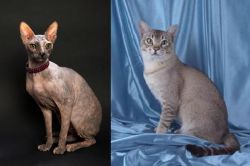 Don Sphynx is originated from Russia but American Keuda is originated from United States. Both Don Sphynx and American Keuda are having almost same weight. Both Don Sphynx and American Keuda has same life span. Both Don Sphynx and American Keuda has same litter size. Both Don Sphynx and American Keuda requires Low maintenance.
Don Sphynx is originated from Russia but American Keuda is originated from United States. Both Don Sphynx and American Keuda are having almost same weight. Both Don Sphynx and American Keuda has same life span. Both Don Sphynx and American Keuda has same litter size. Both Don Sphynx and American Keuda requires Low maintenance.
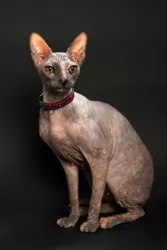 Of Rusian origin, the Don Sphynx is an interesting looking, hairless breed. The cat came about in 1987 when a hairless cat was seen in Rostov-on-Don, a Russian city.
Of Rusian origin, the Don Sphynx is an interesting looking, hairless breed. The cat came about in 1987 when a hairless cat was seen in Rostov-on-Don, a Russian city.
Cat breeder Elena Kovaleva rescued the kitten and it was at about 4 months of age that the kitten began to lose its hair. Later it was mated with a local tomcat and produced kittens which became the founding stock of the Donskoy breed.
The cat breed was recognized by the World Cat Federation in 1997 as well as the International Cat Association later on in 2005.
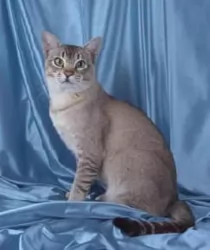 It is thought that the cat was brought to America by the Spanish to keep the rat population down.
It is thought that the cat was brought to America by the Spanish to keep the rat population down.
The name KEUDA stands for Kitten Evaluation Under Direct Assessment which is actually the name of a program that was running in Texas, Oklahoma and New Mexico and was for investigating the kinds of cats that survived as barn cats.
Today the Keuda isn’t registered and it’s not a well-known cat either, being looked upon as being similar to the Egyptian Mau breed as it shares some physical similarities with the Mau.
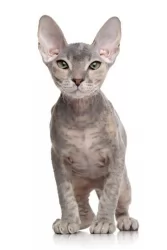 The Don Sphynx is a medium-sized cat known for its large ears and its long, webbed toes.
The Don Sphynx is a medium-sized cat known for its large ears and its long, webbed toes.
Their weight can be anything from 3 to 6 kg It’s a hairless cat but has different skin types that come in different shades – Flock, Rubber Bald, Velour and Brush.
The cat has this dominant hair loss gene that causes the coat they have at birth to thin and fall out. In fact, on close inspection, you’ll find that the cat isn’t entirely hairless but has a very fine layer of fuzz. The skin can be oily and the cat requires bathing fairly regularly.
These particular cats are also more susceptible to the cold and to sunburn. The legs of this cat are long and slender and they have a bit of a bow-legged appearance to them, but this is because of the barrel chest. The tail is long and hard.
These rare cats make excellent pets because they have all the characteristics needed that make them companionable. They are loving, companionable and playful. These are also intelligent, exploring cats which means you’ll need to provide them with games and toys that can keep them occupied.
They’re good with children and other pets and are even good for first-time cat owners. Breeders of these cats will tell you that they are even-tempered and amicable. They are gentle towards children and other pets.
Most of the time the cat has a calm demeanor but is highly sociable. As an entertainer too – he will do anything to get a laugh out of his human family.
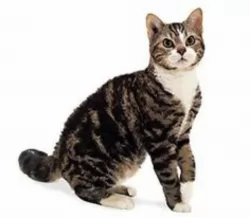 You can’t really pin-point what the American Keuda looks like as it looks a lot like the Maus but it can also look like a Siamese cat or even others.
You can’t really pin-point what the American Keuda looks like as it looks a lot like the Maus but it can also look like a Siamese cat or even others.
It is a medium-sized cat and can weigh up to 5 or 6kg while being very lithe and athletic. The head of the cat is medium-sized, the ears medium-large, the eyes almond-shaped, and the tail is slightly tapered.
An unusual aspect with this cat is its belly flap – loose skin that flaps at each elbow. The head is wedge-shaped, it has almond-shaped eyes, large ears and the fur is soft and silky and in a variety of patterns as well as solid colors. The coat is short to medium in length and there is no undercoat.
American Keudas are just your regular cat in personality - active, adaptable, inquisitive, and intelligent while being strong and agile.
They are also adaptable and social, getting along well with children as well as other pets in the home. It is also quite unusual in that it likes playing with water. They are also playful and love running, jumping and climbing and indoors it will want a climbing cat tree.
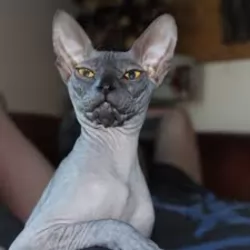 The sphynx cat is an energetic feline that absolutely loves the attention of its human owners. In fact, he will even be willing to show off to get some kind of reaction from his humans.
The sphynx cat is an energetic feline that absolutely loves the attention of its human owners. In fact, he will even be willing to show off to get some kind of reaction from his humans.
This is certainly a cat that has a sense of humor. They’re friendly, loving cats who like to even follow you around the house to be where you are. They are loving and loyal, curious, intelligent and active.
It’s a hardy breed and you won’t have many health issues to contend with. We know that they are prone to skin conditions and periodontal disease so watch out for these with this amazing, but unusual looking cat.
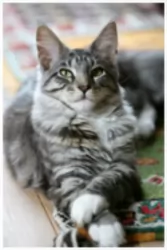 The beauty of American Keuda cats is that they are no-fuss cats and they are energetic, amicable, social, and playful and they make wonderful companions.
The beauty of American Keuda cats is that they are no-fuss cats and they are energetic, amicable, social, and playful and they make wonderful companions.
They are also fond of water and can even strike up a friendship with your dog. By bringing a Keuda into your home you can rely on a steady, loving friendship with your feline friend.
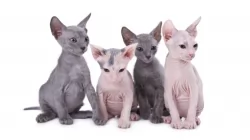 Hairless cats are prone to teeth and gum issues, and every Don Sphynx owner needs to regularly check their cat’s teeth as bad teeth can cause a lot of problems with health as well as discomfort with the teeth.
Hairless cats are prone to teeth and gum issues, and every Don Sphynx owner needs to regularly check their cat’s teeth as bad teeth can cause a lot of problems with health as well as discomfort with the teeth.
This cat breed is also fairly prone to skin problems. You will need to watch him for rashes and fungal infections. Remember, that this strange-looking cat also needs vaccinations and de-worming as well as regular veterinary health checks.
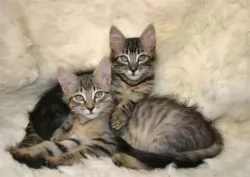 Thes cats enjoy good health and live to be 15 years of age or older even. You just have to watch out for him as they have no undercoats and it’s not a cat to do well in the cold.
Thes cats enjoy good health and live to be 15 years of age or older even. You just have to watch out for him as they have no undercoats and it’s not a cat to do well in the cold.
Whenever you buy a cat for the first time, try and find out about vaccines and previous conditions that might require special treatment.
Healthy kittens and cats are always alert and energetic with shiny coats and clear eyes.
Dental disease is quite common in cats, and it is always a good idea to have your pet’s teeth checked by your vet. Signs of pain with dental problems can include lethargy, pawing at the mouth, facial swelling, and reduced appetite. Get your cat immediately to the vet if you suspect problems with his teeth.
Neutering and spaying are imperative if you don’t want your pet to have kittens. It’s a simple operation for your pet and it comes with many health benefits for your cat. You don’t want your female cat having kittens as there are just already so many stray cats in shelters. Spaying and neutering mellows a cat too, makes them less prone to wandering, spraying, and fighting.
Make sure you have your American Keuda vaccinated against the many cat diseases that there are. Vaccinations are available against feline infectious enteritis or feline parvovirus, cat flu and feline leukemia virus, a disease that damages the cat’s immune system. Kittens require their first vaccine at around 8 weeks of age.
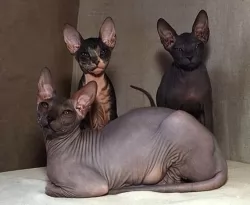 In spite of this being a hairless cat, it still requires frequent grooming, and yet you have to be careful that you don’t allow the cat to be bathed too often either.
In spite of this being a hairless cat, it still requires frequent grooming, and yet you have to be careful that you don’t allow the cat to be bathed too often either.
Have your cat spayed or neutered to avoid kittens that you don’t want. This is beneficial for the cat’s health.
This is a unique cat and when it comes to food, if you can afford it, go for the very best food there is. Good food contributes to good health and this cat is a carnivore and requires food high in meat protein.
Of course, it requires other nutrients and the best commercially manufactured cat foods will have a list of ingredients in them that are important to your cat’s health.
Of course, with diet, there are other important considerations to think about and one of these is the right quantity of food to maintain the cat’s ideal weight. Too much weight gain can put pressure on the cat’s joints and contribute to health problems.
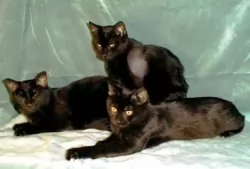 Every cat needs to be fed a complete, balanced high-in-protein food. There are heaps of different brands of cat food on the market - wet and dry. Always follow the manufacturer’s instructions and recommended amounts. If in any doubt about what to feed your cat, speak to your vet. Every cat needs a constant supply of fresh, cool water.
Every cat needs to be fed a complete, balanced high-in-protein food. There are heaps of different brands of cat food on the market - wet and dry. Always follow the manufacturer’s instructions and recommended amounts. If in any doubt about what to feed your cat, speak to your vet. Every cat needs a constant supply of fresh, cool water.
Both young and older cats love to play so ensure you provide your cat with stimulating toys as well as things such as climbing trees and a scratching post. Cats enjoy a high-up place where they can feel safe and view their surroundings from a height.
Cats spend many hours a day sleeping and you need to provide your cat with a warm, dry, comfortable, quiet place to rest. There are many cat beds available, but if you don’t have one, a cardboard box with one side removed and a soft cushion or blanket will do.
Invest in a litter box for your cat to do his business in and keep it in a safe, quiet place where your cat can ‘toilet’ in peace and quiet. These should be placed away from the food and water bowls. Make sure to keep a small plastic rake close by and rake up the cat droppings regularly to ensure the litter tray is nice and clean.
Your American Keuda is a short-haired cat but you want to brush the fur gently at least once a week. Grooming also provides you and your cat with some valuable bonding time.
Provide your cat with a collar to show everyone that he is yours. Also, have your cat microchipped – a tiny chip that carries your pet’s unique ID number and which is inserted safely and gently under the cat's skin.
Have your cat treated and free from parasites such as ticks, fleas, and worms. Speak to your vet about this.